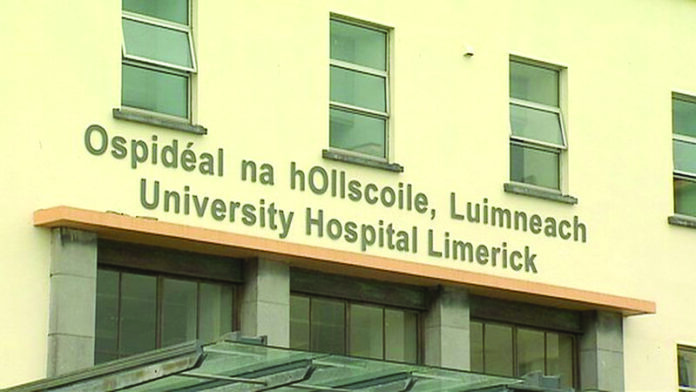
ANOTHER family have been left devastated by the death of a loved one following apparent failings in their care at University Hospital Limerick (UHL), and which has led to the Health Service Executive (HSE) investigating the circumstances of the case.
Michael Cuddihy (76), attended the UHL emergency department (ED) on November 20, 2023, and was discharged 24 hours later having been told he had a stomach bug.
Mr Cuddihy, a father of three from Castletroy, died at his home two days later and a subsequent postmortem concluded he died after an infection which went untreated led to sepsis.
An additional significant note of Michael Cuddihy’s death is that it happened 11 months following the death of Aoife Johnston, which led to a major review of management practices and care in UHL when it emerged that the 16-year-old Shannon girl died of meningitis brought on by sepsis after UHL breached national sepsis protocols by not providing adequate care to Aoife within 10-15 minutes of her presenting at the hospital with suspected sepsis and in a serious condition.
Aoife did not receive antibiotics, which her inquest heard would likely have saved her, for 15 hours and 15 minutes after attending the hospital. She was not seen by a doctor for over 12 hours, as nurses and doctors were under-resourced and the hospital was dangerously overcrowded.
The Limerick ED was then, and still is, a “death trap”, emergency medical consultant Dr Jim Gray told Aoife’s inquest last April.
When Michael Cuddihy died, an internal hospital review into UHL’s treatment of Ms Johnston was ongoing.
In response to queries from RTÉ Investigates about the care given to Mr Cuddihy, the HSE Mid West said: “We can confirm that a systems analysis review is being carried out in relation to Michael’s care in which the Cuddihy family will be invited to participate.”
However, the Cuddihy family have stated they had understood the review of the case had ended.
‘Sent home to die’
In a touching tribute, Anne Cuddihy described her late father as “the most amazing daddy” they could ever have hoped for with “every single memory good”.
“It beggars’ belief that you’re feeling very, very sick and you go into a hospital which is supposed to be a safe place where you think you’ll be looked after and cared for, and you’re actually just sent out of there and sent home to die,” Anne told RTÉ Investigates, which first revealed the review into Michael’s death was ongoing.
Michael complained at home of a bad pain worsening in his side and an ambulance on a Sunday evening, an ambulance was called Monday lunchtime and Mr Cuddihy was ferried by paramedics to UHL.
Anne said Michael telephoned his wife, Áine, and “told her that he was doing okay, that he was on a drip for pain. He said they’ve been doing a scan and some bloods. He felt he was being really well looked after at the time, and he felt they were doing everything they could to look after him.”
A few hours later, having been told his results were clear, Michael was set to be discharged.
“My dad was told there was nothing wrong with him except a bug and that he could go home, and he said to them he didn’t feel well enough to go home, that he was feeling extremely tired. So they agreed to let him stay until the following morning,” explained Anne.
Hospital notes seen by RTÉ Investigates showed that, having asked not to be discharged, Michael was then moved to another section of the ED, where he was later that night discovered by staff to be vomiting with a raised temperature, but it appears there was no medical follow up.
Michael languished on a trolley for a total of 18 hours without being assessed by a doctor, six hours more than Aoife Johnson, who had to be put on a chair before her death because they were no more trolleys in the hospital due to overcrowding.
“When they realised that my dad’s heart wasn’t the issue, instead of checking to see what might be the issue, they essentially dismissed him and that was the end of my dad seeing a doctor,” Anne said.
Michael was discharged even though he was unable to walk. Anne said she collected her father, who was taken out of UHL by wheelchair and exhausted.
He went straight to his bed when he got home, where he stayed for the following 48 hours while continuing to vomit.
Anne said her mother noticed Michael’s foot was “ice cold” in the bed.
“And then she checked my dad and she realised he was gone.”
Despite being scanned and undergoing blood tests at UHL, Michael’s postmortem results revealed that a gallstone had been trapped in his stomach bile duct, which caused an infection, which when untreated led to sepsis, resulting in his death.
Anne said her mother was left traumatised finding her husband dead in their bed.
“She is totally and utterly devastated. When I say they were soulmates, I mean they were the epitome of soulmates. She has said to me that she feels like her own life is over,” she said.
‘We got it wrong’
After receiving Michael’s postmortem results, the Cuddihy family scheduled a meeting with UHL management.
“Straight away the consultant said I would like to offer my condolences and apologise, and he held his hands up and he said, ‘we got it wrong’. To say we were floored is an understatement,” Anne said.
“They told us a lot of mistakes were made and they told us what the mistakes were, and it was an endless list of mistakes.”
Minutes from two meetings UHL management held with the Cuddihy family reveal a series of alleged failings in Michael’s care, with senior medical staff acknowledging Michael shouldn’t have been sent home, that there had been too much focus on a possible aneurysm and it had provided a false sense of security when none was found.
The documents, seen by RTÉ Investigates, also state that Michael’s blood tests were incomplete and should have been redone; that his white cell count had increased which suggested he had an infection; his temperature was raised, but neither this nor his deterioration overnight was acted on.
UHL admitted there were several opportunities where things could have been done differently in Michael’s care, adding, that “if we could rewind the clock, it would be different”.
“If he had been given IV antibiotics when he arrived at the hospital, I wouldn’t be sitting here talking to you. It’s horrific,” Anne said.
Despite the stark findings in minutes of these meetings, the Cuddihy family were somewhat reassured when UHL stated it wanted to take learnings from Michael’s untimely death in order to try to ensure a similar case did not happen in future.
However, when they learned in media reports of the similar circumstances of Aoife Johnson’s death, they were horrified.
“Poor Aoife died in December 2022 and my dad died in November 2023. My dad died from sepsis too and I just don’t understand how after the death of a 16-year-old girl, they cannot go all out to ensure that this doesn’t happen to somebody else, whatever age they are. They clearly didn’t learn from that,” Anne said.
“People are dying unnecessarily because the whole thing is a shambles – it’s an absolute shambles.”
Full review to take place
As if losing Michael in such circumstances wasn’t bad enough, the Cuddihy’s learned earlier this month that on the day Michael was discharged from UHL, the Health Information and Quality Authority (HIQA) had conducted an unannounced inspection of the hospital’s ED, which found risks of harm to patients as well as patients care not being fully managed.
The HIQA report, published earlier this month, noted UHL had significant improvements to make, there was unacceptable patient overcrowding, and crucially – that an Emergency Medicine Early Warning System, for recognising and responding to deteriorating patients, had not been implemented on the day Michael was discharged.
Despite this, the HIQA report found that, on the day, there had been a “considerable improvement in the staffing complement for all disciplines”, including nurses, from previous inspections.
Anne Cuddihy said she and her family are “baffled” by HIQA finding that staff levels had improved “because we were told by people in UHL when we met them that they were down 20 nurses when my dad was in hospital, that does not make sense to me whatsoever”.
HSE Mid West confirmed to RTÉ Investigates that there were nursing shortages during Michael’s stay at the hospital, but it suggested the number was not as low as had been indicated to the family.
It said that recommendations from a preliminary assessment of the care given to Michael have since been implemented in full, and that it absolutely recognises the increased risk to patient safety arising from chronic overcrowding at UHL’s emergency department which it said it is working to address.
The HSE has invited the Cuddihy family to participate in UHL’s internal review of the circumstances which led to Michael’s death.
However, earlier this year, the Cuddihys were told at their meeting with UHL that a review was not necessary “as all the deficits were identified in the preliminary assessment” and another investigation would not garner any further information.
Following contact from RTÉ Investigates, the family were informed this week that a full review would now take place.
Anne Cuddihy concluded that “every time something like this happens, families always ask for it not to happen to any other family, and it’s what we all want. We don’t want it to happen to any other family, and yet it does. Well, can this be it now? Change needs to happen, and it needs to happen now.”









